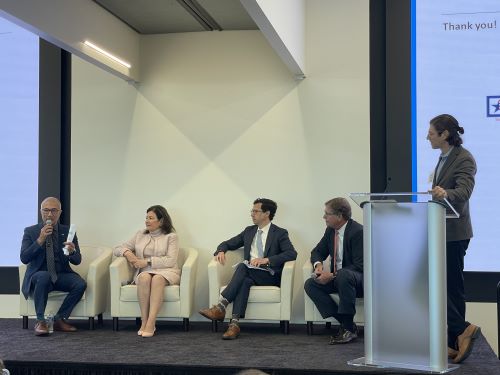President Trump: “We Do Need People Coming Into our Country...At 3.9% Unemployment, We Need People Coming In"
 Acknowledging the valuable role that immigrants and migrant workers play in helping meet the diverse workforce demands of the growing US economy, President Donald Trump said “we do need people coming into our country,” at a recent roundtable on tax reform held in Cleveland. “You know, at 3.9% unemployment, we need people coming in. But I will tell you this, we want people to come into our country on the basis of merit,” he said.
Acknowledging the valuable role that immigrants and migrant workers play in helping meet the diverse workforce demands of the growing US economy, President Donald Trump said “we do need people coming into our country,” at a recent roundtable on tax reform held in Cleveland. “You know, at 3.9% unemployment, we need people coming in. But I will tell you this, we want people to come into our country on the basis of merit,” he said.
The president’s recent remarks reveal that he has been listening to economists and understands that with America’s aging population demographic, booming economy, extremely low unemployment level, and increasing labor shortages, we need more productive, young, and tax-paying workers.
“With the economy growing well above trend, and the working-age population barely growing at all, we expect the labor market to significantly tighten in the coming year. At 3.9 percent, the unemployment rate is historically low, and we expect it to be around 3.5 percent a year from now,” said the Conference Board on Employment Trend’s chief economist for North America, Gad Levanon, in a recent report.
In order for the United States’ economy to achieve its optimal rate of economic growth and productivity and the benefits for all Americans that this includes, it will continue to rely on immigrants and migrant workers to fill the jobs that Americans are unavailable to do. While the president acknowledging this fact is a positive political development, he will need to continue to pressure Congress to pursue immigration legislation to produce results that are in the best interests of Americans.
Perhaps the lowest hanging fruit in that regard would be legislation to protect the economically productive and culturally assimilated Dreamer population from deportation. While the White House released a framework in January on what it would like immigration legislation to entail, it was met with significant opposition because it asked for a reduction in future legal immigration levels. Now that the President has acknowledged that a healthy and measured level of legal immigration is good for the American economy, he may be more effective in leading Republicans and Democrats in Congress to produce immigration legislation that can actually get enough votes to pass.
First, President Trump should make sure that we do not worsen our economy’s labor shortages by deporting the unauthorized immigrants who have no viable path to obtaining legal immigration status and are currently working in America contributing to our economy and following our laws. An ideal first step would be to provide the 700,000-1.8 million young, educated, and law-abiding Dreamers who came the United States illegally as children with a pathway to earn legal status so that they can work legally and pay taxes, coupled with some funding to help adequately secure the border so we know who and what are coming in to our country. Will Hurd’s (R-TX) USA Act does just that, and avoids including more controversial and complicated measures that have deterred progress on immigration reform in the past.
After Congress secures the border and protects Dreamers, it can work to solve the problem of the remaining ~9 million unauthorized immigrants who have been living and working in the United States and currently have no viable path to earn legal status. A solution like the ID and Tax plan would allow all the non-criminal unauthorized immigrants who can pass background checks to earn IDs and continue contributing to our economy, making sure that they and their employers are paying the proper taxes, while freeing up ICE resources to be able to pursue the actual violent criminal aliens looking to do our nation harm.
It's refreshing to see President Trump, a successful businessman and developer himself, acknowledging the valuable role that immigration serves in helping to meet American businesses' workforce needs. Perhaps now he will lead Congress in legislating immigration reform that will help to meet the diverse demands of our economy.








